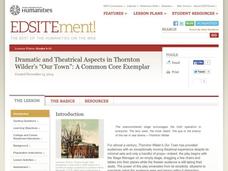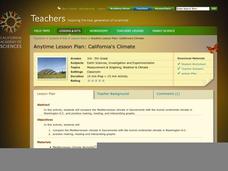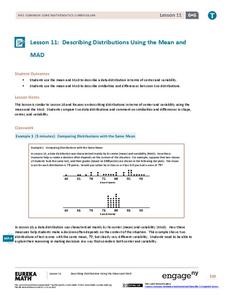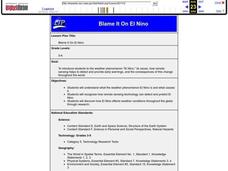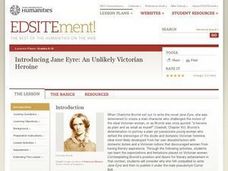Field Museum
The Case of Darwin's Finches
One of the most striking pieces of evidence for Darwin's Evolution of Species was his observations of finches and how their beaks differed from island to island, depending on their primary food sources. So what would happen to the theory...
National Endowment for the Humanities
Dramatic and Theatrical Aspects in Thornton Wilder’s “Our Town”: A Common Core Exemplar
“So I’m going to have a copy of this play put in the cornerstone and the people a thousand years from now’ll know a few simple facts about us.” Our Town is used as the text in a Common Core exemplar that examines the dramatic and...
Dick Blick Art Materials
“Decalcomania” Glue Paint Symmetry Prints
Who knew you could paint with glue? After first adding liquid water color paints to bottles of white Elmer's glue and applying them to paper, young scholars of all ages are then challenged to use their imagination and creativity to draw...
Curated OER
Grow an Alum Crystal
What an exciting lab experiment to conduct with your high school chemistry class! Crystals are formed naturally in the environment. However, allow your blossoming chemists to create their own unique crystals using alum and water. You may...
MENSA Education & Research Foundation
Magical Musical Tour: Using Lyrics to Teach Literary Elements
Language arts learners don't need a lecture about poetry; they listen to poetry every day on the radio! Apply skills from literary analysis to famous songs and beautiful lyrics with a lesson about literary devices. As class...
University of Georgia
What's So Special about Bottled Drinking Water?
Is artesian water designed to be better, or is it just from wells similar to those in the city of Artesium? This experiment looks at many different types of bottled waters, including artesian. Using a soap mixture, scholars test to see...
NOAA
What Little Herc Saw
See the underwater world through a different pair of eyes! Middle school marine biologists identify deep-sea organisms by examining images taken by an ROV from the Okeanos Explorer. After determining what creatures lie beneath the...
EngageNY
Characteristics of Parallel Lines
Systems of parallel lines have no solution. Pupils work examples to discover that lines with the same slope and different y-intercepts are parallel. The 27th segment of 33 uses this discovery to develop a proof, and the class determines...
Curated OER
Writing Women: The Yellow Wallpaper
Students examine the historical, social, cultural and economic context of Charlotte Perkins Gilman's story, The Yellow Wallpaper. Students determine the place of the middle class woman and her role in society.
Curated OER
Brave New World: Biopoem
“Words can be like x-rays if you use them properly—they’ll go through anything.” Readers of Brave New World will be pierced by an activity that asks them to use details from the text to craft a biopoem for one of the characters in Aldous...
California Academy of Science
California's Climate
The United States is a large country with many different climates. Graph and analyze temperature and rainfall data for Sacramento and Washington DC as you teach your class about the characteristics of Mediterranean climates. Discuss the...
Curated OER
Comparison of Economic Systems
Here is a worksheet in which learners identify and compare economic systems (market, command, mixed, etc.) with 18 fill-in-the-blank questions and a graphic organizer.
Curated OER
Circumcenter of a Triangle
Your geometry learners will discover and show the construction of the circumcenter of a triangle. Guided by the steps in the activity, they construct perpendicular bisectors of each side that have a point of concurrency called the...
Statistics Education Web
First Day Statistics Activity—Grouping Qualitative Data
Making groups of groups can help to organize data. Classes use statistics to group themselves using descriptive adjectives. The objective is for learners to understand that grouping qualitative data is useful when the original groups are...
EngageNY
Describing Distributions Using the Mean and MAD II
The 11th lesson in the series of 22 is similar to the preceding lesson, but requires scholars to compare distributions using the mean and mean absolute deviation. Pupils use the information to make a determination on which data set is...
Concordia College Archives
Our School Song
Show your school spirit! Class members use instruments or sing along and employ what they have learned in the two previous lessons to perform their school's songs.
Curated OER
Blame It On El Nino
Students study the weather phenomenon El Nino is and what causes it, and recognize how remote sensing technology can detect and predict El Nino. Students discover how El Nino affects weather conditions throughout the globe through research.
Curated OER
Art in Nazi Germany When Art and Politics Didn't Agree
Five lessons display the art created by Germans under the Weimar Republic. The focus of these lessons is to help learners understand the role of art in politics, government censorship, and Nazi tactics. Web links are included.
Curated OER
Oliver Twist Goes to Hollywood
How does Oliver Twist, the novel written by Charles Dickens, compare with its screenplay adaptation? Although the activity doesn't require learners to have read the novel, the similarities and differences of the highlighted passages...
Curated OER
Analyzing the Use of Irony in a Short Story
Ninth graders examine how literature connects to real-life and see how irony aids in the development of theme. They read Shirley Jackson's The Lottery, and discuss elements of foreshadowing and situational irony. Then learners will write...
Curated OER
it's Lonely At The Top
Students explore the differnences between food producers in food webs and food consumers in food chains. Behavioral choices of primary and secondary consumers such as herbivores, vegetarians, carnivors, and omnivors are analyzed.
Curated OER
A House Dividing: The Growing Crisis of Sectionalism in Antebellum America
Students explore the debates over American slavery and the power of the American federal government for the first half of the 19th century and how the regional economies and political events produced a widening split between the states.
Curated OER
Introducing Jane Eyre: An Unlikely Victorian Heroine
High schoolers investigate the expectations and limitations placed on Victorian women and evaluate Charlotte Bronte's position and desire for literary achievement in using the male pseudonym, Currer Bell.
National Endowment for the Humanities
Lesson 1: The First Great Awakening
High schoolers examine the First Great Awakening and how it affected religious belief in colonial America. They read and analyze primary source documents, explore various websites, and write a five-paragraph essay examining the beliefs...
Other popular searches
- Indirect Characterization
- Adjectives Characterization
- Teaching Characterization
- Characterization Worksheets
- Chaucer's Characterization
- Characterization Power Point
- Direct Characterization
- Analyze Characterization
- Characterization Literature
- Characterization Test
- Characterization in Fiction
- Characterization Methods



